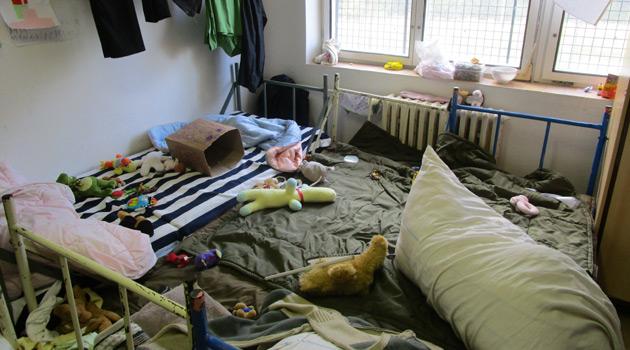Czech court decides it was unconstitutional for family from Kosovo to be detained in Bělá-Jezová deportation facility

The arrest and detention of a migrant from Kosovo and his two children for 50 days in the Bělá-Jezová deportation facility in 2014 violated their fundamental rights. The Czech Constitutional Court handed down its ruling in the matter on 23 May.
The assignment of the family to the facility for detaining foreign nationals in the Mladá Boleslav area was neither necessary nor proportionate, according to their complaint. The Czech Constitutional Court did not discover that any ill-treatment had been committed against them during their detention, but did point out that in 2014 there was no legal basis for the detention of foreigh nationals prior to their being returned to another EU country where they had applied for asylum.
Until December 2015, Czech law did not expressly describe what the criteria were for a person to be considered a “flight risk”. The length of he family’s detention at Bělá-Jezová was not optimal, according to the justices, but no cruel, degrading or inhuman treatment was proved to have happened there.
The Constitutional Court justices said in their finding that a situation in which a father was breaking lawful regulations in order to leave a country where he had already applied for asylum and who wanted, after being detained, to remain together with his children was one where all of the available solutions had been bad ones. The children were forced to stay with their father on the closed campus of the facility under the supervision of the security services.
The man crossed the Serbian border into Hungary with his four-year-old and six-year old children. He was arrested there and applied for asylum.
After that, however, he brought his children with him on a train heading to Germany. That trip ended after a border check in Břeclav, Czech Republic.
Czech Police decided to arrest the father and then return him to Hungary according to the Dublin Regulation. The man was held with his children at Bělá-Jezová from 16 March until 5 May 2014.
The family from Kosovo unsuccessfully appealed the decision to arrest them with the Regional Court in Brno and then with the Supreme Administrative Court. That was followed by a Constitutional Court complaint in which they pointed out how long they had been detained and that the material conditions for the children at Bělá-Jezová had not been good.
The family’s complaint also mentioned the psychological impact of the detention on their lives, the uncertainty about the future they experienced while in detention, and the absence of any activities or games organized with any other children at the facility. The complaint said a more proportionate alternative would have been for the family to be housed at the Reception Center for Asylum-Seekers in the town of Zastávce u Brna.
The Czech Supreme Administrative Court had asked the European Court of Justice in 2015 a so-called “preliminary question” about a different but similar case because of disputes over the fate of refugeees per se in the Czech system, asking for clarification on whether it was justifiable to arrest migrants in a situation for which Czech law had yet to define the criteria according to which an objective decision could be made about whether the detainees posed a “serious flight risk”. The question concerned the rights of foreign nationals who were to be relocated to other states of the EU for the assessment of their asylum applications under the Dublin Regulation.
This March the European Court of Justice decided that a Member State is not authorized to arrest an asylum-seeker for the purpose of arranging for his or her relocation to another Member State if the arresting state has not outlined in its own laws the objective criteria for assessment of the existence of a danger that the person in question would flee. If legislative definitions are missing, then that controversial part of the Dublin Regulation cannot be applied.
In the interim, a more precise definition of the criteria has already been added to the Czech law on the residency of foreign nationals. A foreign national is to be considered a serious flight risk in the Czech Republic if s/he has resided on the territory of the state without authorization, previously avoided being transferred to another country, attempted to flee, expressed the intention not to respect a valid decision to be relocated to another state, or if such an intention is apparent from the foreign national’s behavior.
